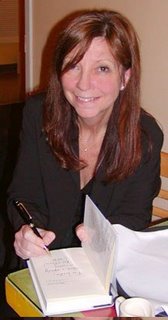 Nazis are causing a buzz these days at the Frankfurt Book Fair. Jonathan Littell’s forthcoming novel, Les Bienveillants, features an unrepentant SS officer as protagonist and the first-person narrator of his ambitious tome. The sensation made me reflect on other books dealing with World War II and the Holocaust. Of course, my musings tended toward crime-fiction writers, and that brought me to novelist Cara Black.
Nazis are causing a buzz these days at the Frankfurt Book Fair. Jonathan Littell’s forthcoming novel, Les Bienveillants, features an unrepentant SS officer as protagonist and the first-person narrator of his ambitious tome. The sensation made me reflect on other books dealing with World War II and the Holocaust. Of course, my musings tended toward crime-fiction writers, and that brought me to novelist Cara Black.While Cara’s books are near-contemporary (her latest book, Murder in Montmartre, is set in 1995), there is no denying that the francophile author’s attentions are drawn to the European theater of WWII and accompanying Nazi atrocities. In fact, the first novel in her Aimée Leduc P.I. series, Murder in the Marais (1998), dealt primarily with this very thing. Cara readily talked about these interests, when I interviewed her last spring. (The results of that interview will appear in an upcoming issue of the Anthony Award-winning Crimespree Magazine.) Due to print limitations, I had to shorten our conversation somewhat, and an excised topic was the practice of Lebensborn, which Cara mentions in her latest novel, and which, she explains there, “referred to the Nazi stud-farm program to propagate Aryans. It had been established in Norway, Germany, and occupied Europe. Even a member of the seventies group ABBA was listed in the documentary as a child of the Lebensborn.”
Lebensborn was eugenics brought to practical reality--a wholly fascinating and creepy practice. My discussion of the topic with Cara went as follows:
Cara Black: You write what you want to read, and what I wanted to read about was World War II. I found that [to be] a fascinating time.
Anthony Rainone: No matter what the big concept of your book might be--the book you are writing at the time, I notice that WWII creeps into your books. In Murder in Montmartre, there is the fact of Lebensborn. I had never heard of it before. And you write that a member of ABBA was one?
CB: That’s true. It was the brown-haired female member. She was born in Norway, and then they left for Sweden. She met her real father--a German man--later on in life. And there is a whole generation of people that age, who were born and don’t know their background. Or, they were ostracized. But they had [Lebensborn] all over Europe. Many in Norway and one in France. And this woman--who’s a friend now--we met for lunch and she said “Cara, you need to know about this.” And she said she lived in a village that had one. No one talked about it. The mayor said not to bring it up. No one needs to talk about it.
AR: Like so many things about the Nazis. Keep it under cover. God knows what else will come to light in the future.
CB: Yes. And in this particular Lebensborn that my friend talked about, you know, they had people from the village work in that house. People to clean, for example. And no one talked about it.
If you want to read the rest of the interview, you’ll need to buy the next issue of Crimespree Magazine. In the meantime, you should check out these latest photos that Cara took in Paris. Man, they are gorgeous. I’ve got to parlez-vous real soon.

















3 comments:
I just finished Philip Kerr's new book, set in post-WWII Germany and Austria, and featuring Bernhard Gunther, the main character from three earlier novels.
It was pretty damn good, too, but depressing finding out the horrible things ordinary people can get up to. Makes poison gas seem almost quaint.
Good timing for the Cara Black interview, and a pertinent comment from Graham Powell. I posted some comments on my blog yesterday about crime novels set in wartime. (http://detectivesbeyondborders.blogspot.com/2006/10/life-during-wartime_10.html) In particular, I note how some writers seem uneasy dealing with such painful subjects. Philip Kerr seems more comfortable writing about the Nazi era in Germany that some other writers of crime novels with wartime settings.
Peter
========================
Detectives Beyond Borders
"Because Murder is More Fun Away From Home"
And, of course, that selection from the interview makes me want to find out how that eugenics program figures in the novel.
Post a Comment